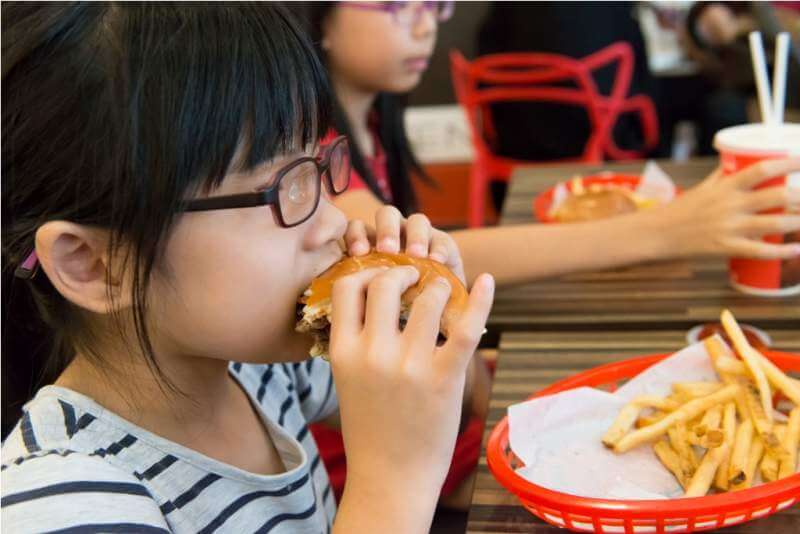The sight of a big piece of yummy brownie oozing with chocolate dripping from its center can make any sugar lover’s knees go weak. The temptation to avoid gulping that piece down is often unbearable. After all, it takes up a lot of courage to say no to such a pleasurable delight. Same is the case for a crunchy piece of spicy potato chips, your favorite hamburger, or a bucket full of fries.
Irresistible temptation, pleasure, and futile efforts at controlling the intake of all such junk foods compel neuroscientists to study our brain mechanisms that kick off when we can’t seem to get over our stock of junk food.
Obesity is another reason why neuroscientists study the impacts junk food has on our brain. In 2017 alone, the obesity prevalence in the US amounted to 31.3%, according to a source. Therefore, where the matters of health are concerned, be it mental or physical health, it is essential to keep a check on what you’re feeding to your brain and your body. Choosing brain super foods over junk and unhealthy ones will undoubtedly give a boost to your health.
Junk food addiction
 Yes, you read it right, people can get addicted to junk food just like drugs. The irresistible urge of craving for junk food and the failed attempts to control oneself from overeating are all signs of addiction.
Yes, you read it right, people can get addicted to junk food just like drugs. The irresistible urge of craving for junk food and the failed attempts to control oneself from overeating are all signs of addiction.
Why junk food acts like crack
1. It kicks off the brain reward system
 Our brain is hardwired to seek pleasure, and for which dopamine, a neurotransmitter, is responsible. Dopamine detects items or behaviors that are delightful for the brain,and it shoots off more dopamine in the system. Thus, the brain signals the need for more such behaviors.
Our brain is hardwired to seek pleasure, and for which dopamine, a neurotransmitter, is responsible. Dopamine detects items or behaviors that are delightful for the brain,and it shoots off more dopamine in the system. Thus, the brain signals the need for more such behaviors.
The fatty and sugar contents in junk food leave pleasurable impacts on the brain; thus, kicking off the brain reward system. The reward from junk food is incomparable to the whole foods, which is why;junk food stimulates your brain reward system way more than the healthy foods.
Thus, people continue to consume junk food, because your brain ‘likes’ it.
2. Shows tolerance and withdrawal signs when stopped
 Have you ever wanted to quit having more fries or thought about reducing the number of popcorns you munch on while watching your favorite TV series but failed? Or has this attempt left you with wanting more?
Have you ever wanted to quit having more fries or thought about reducing the number of popcorns you munch on while watching your favorite TV series but failed? Or has this attempt left you with wanting more?
It is one of the typical signs of addiction. The repeated act of providing your brain with pleasure stimulants results in an increased threshold of dopamine. This increase renders your body to be in constant need of that delightful activity.
As consuming junk food stimulates the dopamine receptors, attempts to stop having such food triggers withdrawal and tolerance signs. Similar to drug addiction, when you try to stop having junk food, your body craves for more than before because the low levels of dopamine are making you want more.
3. Loss of control: cravings and binge eating
 Junk food gives you cravings, and they are so bad that you’d want to jump right up from your bed or couch and grab a packet of your favorite chips. Cravings have no connection with real hunger. It is to say that cravings for junk food are not actually out of nutritional needs of your body.
Junk food gives you cravings, and they are so bad that you’d want to jump right up from your bed or couch and grab a packet of your favorite chips. Cravings have no connection with real hunger. It is to say that cravings for junk food are not actually out of nutritional needs of your body.
Therefore, if junk food renders you to uncontrollable eating and at weird times of the day, they are acting similar to the drugs. Cravings are said to be mostly related to the certain emotional triggers.
4. Emotional reactivity and impulsivity
 Drugs inculcate emotional states that make you want to achieve those states whenever the need arises. The same thing happens with junk food. Were you ever down and found yourself lifting up your mood with a cup of ice cream? It is probably because sugar and fatty contents in the ice cream help kick off your reward system; thus, lowering the stress receptors. It is known as emotional reactivity.
Drugs inculcate emotional states that make you want to achieve those states whenever the need arises. The same thing happens with junk food. Were you ever down and found yourself lifting up your mood with a cup of ice cream? It is probably because sugar and fatty contents in the ice cream help kick off your reward system; thus, lowering the stress receptors. It is known as emotional reactivity.
Moreover, the emotional reactivity makes you conditioned to lifting up your mood by junk food cravings and consumption, which is a behavior similar to drugs.
Impulsivity is another implication of how junk food acts as a drug for your brain. The out-of-nowhere cravings and their instant cravings are all signs of impulsivity. It is a routine that is very close to drug addiction.
Final word
Similarities between junk food consumption and drug addiction set the foundation of why there is unmanageable obesity. It is beneficial in determining the course of action of getting rid of junk food addiction.
Obesity is as much of a concern as is an addiction. Both are damaging to the health of the overall society. Eating a healthy and nutritional diet is a promise of a wholesome life, which should be the ultimate goal of every person who loves life.
Therefore, choose what you feed your body wisely. Go for healthy foods that fuel your body, brain, and heart with more fitness and robustness. Heart and mind are amongst the vital organs of your body,and if any of their processes get disturbed, the impacts could be life-threatening.
Author Bio Ashley Rosa:
Ashley Rosa is a freelance writer and blogger. As writing is her passion that why she loves to write articles related to the latest trends in technology and sometimes on health-tech as well. She is crazy about chocolates. You can find her at twitter: @ashrosa2.

 Ashley Rosa is a freelance writer and blogger. As writing is her passion that why she loves to write articles related to the latest trends in technology and sometimes on health-tech as well. She is crazy about chocolates. You can find her at twitter: @ashrosa2.
Ashley Rosa is a freelance writer and blogger. As writing is her passion that why she loves to write articles related to the latest trends in technology and sometimes on health-tech as well. She is crazy about chocolates. You can find her at twitter: @ashrosa2.